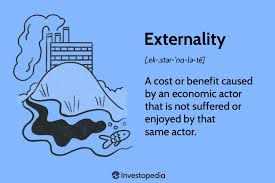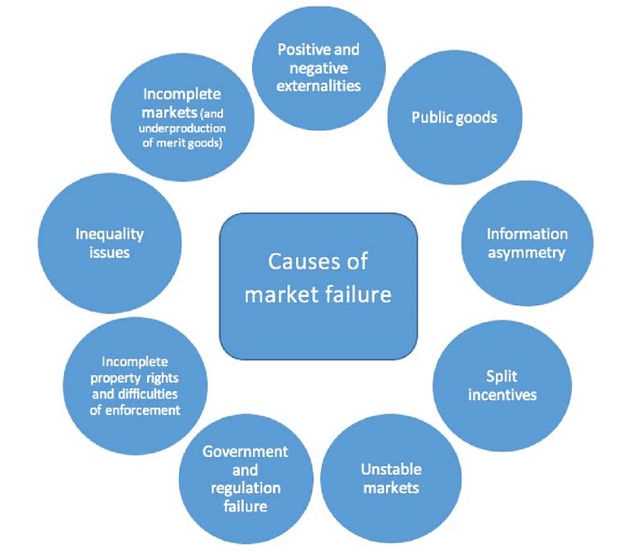Types of Market Failure
In economics, market failure refers to a situation where the allocation of goods and services by a free market is not efficient, resulting in an inefficient allocation of resources. There are several types of market failures that can occur in different market structures:
1. Monopoly Power

Monopoly power occurs when a single firm has control over the market and can set prices and output levels to maximize its own profits. This leads to higher prices and lower quantities produced compared to a competitive market, resulting in a loss of consumer surplus.
2. Externalities

Externalities occur when the production or consumption of a good or service affects third parties who are not directly involved in the market transaction. Positive externalities, such as education or vaccination programs, result in underproduction because the social benefits exceed the private benefits. Negative externalities, such as pollution or traffic congestion, result in overproduction because the social costs exceed the private costs.
3. Public Goods
Public goods are non-excludable and non-rivalrous, meaning that once provided, they are available to everyone and one person’s consumption does not reduce the availability for others. This leads to the free-rider problem, where individuals have an incentive to not contribute to the provision of public goods but still benefit from them. As a result, public goods are often underprovided in the market.
4. Information Asymmetry
Information asymmetry occurs when one party in a transaction has more information than the other party. This can lead to adverse selection, where the party with less information is at a disadvantage and may make suboptimal decisions. It can also lead to moral hazard, where one party takes more risks because they know the other party cannot fully monitor or control their actions.
5. Market Power

| Type of Market Failure | Description |
|---|---|
| Monopoly Power | A single firm has control over the market and can set prices and output levels. |
| Externalities | The production or consumption of a good or service affects third parties. |
| Public Goods | Non-excludable and non-rivalrous goods that are often underprovided in the market. |
| Information Asymmetry | One party in a transaction has more information than the other party. |
| Market Power |
Causes of Market Failure

Market failure occurs when the allocation of resources in a market is not efficient, leading to a suboptimal outcome. There are several causes of market failure, including:
- Income Inequality: Income inequality can also lead to market failure. When there is a significant disparity in income levels, certain individuals or groups may not have access to essential goods and services, resulting in a suboptimal allocation of resources. This can lead to social and economic inefficiencies.
These are just a few examples of the causes of market failure. It is important for policymakers and economists to understand these causes in order to design appropriate interventions and regulations to address market failures and promote economic efficiency.

Emily Bibb simplifies finance through bestselling books and articles, bridging complex concepts for everyday understanding. Engaging audiences via social media, she shares insights for financial success. Active in seminars and philanthropy, Bibb aims to create a more financially informed society, driven by her passion for empowering others.
